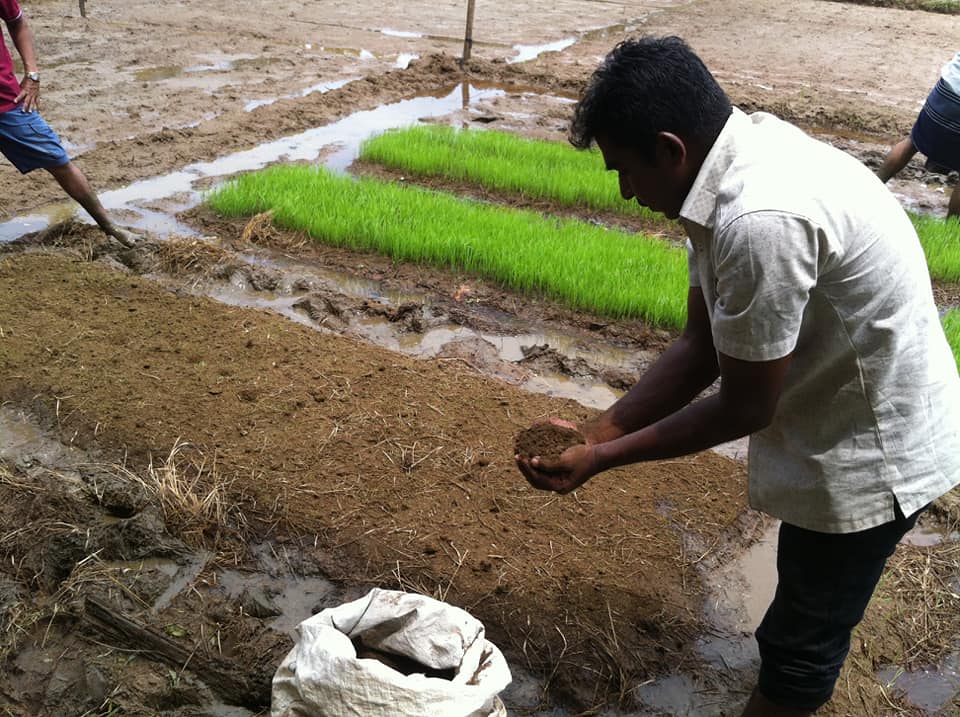
Understanding Past Failures of Organic Farming in Sri Lanka
In the lush landscapes of Sri Lanka, where agriculture has been a cornerstone of livelihoods for generations, the transition to organic farming has been met with both hope and hurdles. While the promise of toxin-free agriculture and sustainable practices is enticing, the journey has been fraught with challenges that need careful consideration and understanding. Let’s delve into the reasons behind past failures of organic farming in Sri Lanka, dissecting each issue to pave the way for a more successful future.
How Sri Lanka can transition to organic alternatives for pest and weed control
One of the critical stumbling blocks in the past failures of organic farming in Sri Lanka was the misconception that simply replacing agrochemicals with organic alternatives would suffice. This narrow view failed to grasp the essence of organic farming, which demands a comprehensive systemic shift.
Organic farming is not just about changing inputs; it’s about transforming the entire agricultural system. This includes nurturing the health of soil and water bodies, which serve as the bedrock of agricultural productivity. Improving soil health through practices like composting and crop rotation fosters biodiversity and resilience, while proper water management ensures sustainable irrigation practices that conserve this precious resource.
Furthermore, organic farming necessitates a departure from monoculture practices towards diversified crop mixes. Monocropping, common in conventional agriculture, depletes soil nutrients and increases susceptibility to pests and diseases. Embracing crop diversity not only enhances ecosystem resilience but also provides economic stability for farmers by reducing dependency on a single crop.

Monocropping depletes soil nutrients and increases susceptibility to pests and diseases © Renaissance Sri Lanka
Additionally, changes in value-chain management are imperative for the success of organic farming. From production to distribution, organic products require distinct handling and marketing strategies. Establishing transparent and fair value chains ensures that organic farmers receive equitable returns for their efforts, incentivizing further adoption of organic practices.
In essence, the failure to recognize the need for a holistic systemic shift impeded the progress of organic farming in Sri Lanka. Moving forward, it’s crucial to understand that organic agriculture is more than just a change in inputs; it’s a paradigm shift towards a more sustainable and resilient agricultural system.
Strategies for overcoming farmer’s Resistance to Change with simple tactics
Farmers deeply entrenched in conventional practices often find it challenging to break free from their habits. These practices are often deeply ingrained in their farming routines, shaped by years of tradition, reliance on familiar methods, and sometimes financial constraints. However, with the increasing awareness of environmental sustainability and health concerns, many farmers are considering transitioning to organic methods.

Many farmers use chemical-based fertilizers to increase harvest © Renaissance Sri Lanka
Understanding the diversity among farmers is crucial in facilitating this transition. Farmers come from varied backgrounds, with different levels of education, access to resources, and motivations. Some may be driven by market demands for organic produce, while others may be motivated by environmental stewardship or personal health reasons.
Tailoring approaches to meet the specific needs of different types of farmers is essential. For example, providing financial incentives or subsidies can help alleviate the initial costs associated with transitioning to organic farming. Education and training programs can also empower farmers with the knowledge and skills needed to implement organic methods effectively.
Furthermore, fostering a supportive community where farmers can share experiences, challenges, and successes can also facilitate the adoption of organic practices. By recognizing and addressing the diverse needs of farmers, we can create a more sustainable and resilient agricultural system that benefits both farmers and the environment.
Leveraging of Indigenous Knowledge for organic farming in Sri Lanka
The invaluable wisdom of existing organic practitioners, deeply rooted in traditional sciences, was overlooked. Leveraging their expertise could have provided invaluable insights into the organic farming movement. Drawing from centuries-old practices and indigenous knowledge, these practitioners possess a wealth of information on sustainable farming methods, natural pest control, and soil fertility management. By acknowledging and incorporating their wisdom into modern organic farming initiatives, we can enhance the effectiveness and sustainability of agricultural practices while preserving traditional ecological knowledge.

Renaissance Sri Lanka & MONLAR Training Session – Practical Training on indigenous methods of farming © Renaissance Sri Lanka & MONLAR
The Underestimated Extent of Environmental Degradation from Conventional Agriculture
The underestimated impact of agrochemicals on soil and water pollution poses a significant challenge to agricultural sustainability. Acknowledging and addressing this contamination is crucial for the success of organic farming initiatives. Transitioning to organic methods offers a solution by reducing reliance on harmful chemicals and promoting soil and water health. Embracing organic farming practices not only mitigates pollution but also fosters a more environmentally friendly and sustainable approach to agriculture. By prioritizing the restoration and protection of our natural resources, we pave the way for a healthier and more resilient food system for generations to come.
What are the socioeconomic Implications of Transitioning to Organic Farming?
Transitioning to organic farming carries significant socioeconomic implications that often go overlooked. While the shift promises benefits like improved environmental sustainability and reduced chemical exposure, the effects on farmers’ incomes and workloads deserve closer examination.
One crucial aspect is the potential impact on income. Organic farming typically requires more labor-intensive practices and may yield lower initial crop yields compared to conventional methods. This shift in production methods can affect farmers’ profitability, especially during the transition period when yields may be lower, but the premium prices for organic products have not yet been realized.
Moreover, the transition to organic farming can also affect farmers’ workloads. Organic methods often involve more manual labor for tasks like weed control and pest management, which can increase the time and effort required for cultivation. This shift may disproportionately affect small-scale farmers who lack the resources to invest in labor-saving technologies or hire additional help.
Ensuring equitable outcomes for primary producers is vital for the long-term sustainability of organic agriculture. Policymakers and stakeholders must consider strategies to support farmers through the transition, such as providing financial assistance, technical support, and access to markets that offer fair prices for organic products. By addressing these socioeconomic challenges, organic farming can fulfill its promise of environmental stewardship while also supporting the livelihoods of those who cultivate the land.
The Importance of Nutrition Density in Food Production
Despite advancements in nutritional science, the misconception persists that yield density outweighs nutrition density in food production. However, acknowledging the significance of nutrition density is paramount for fostering healthier food systems. While high-yield crops may seem appealing for mass production, prioritizing nutrition density ensures that foods are not only abundant but also packed with essential vitamins, minerals, and other nutrients vital for human health. By shifting the focus towards nutrient-rich foods, we can promote better overall health outcomes, combat malnutrition, and create more sustainable agricultural practices. Embracing nutrition density as a guiding principle is key to building a more nourishing and resilient food system for future generations.
Transforming Barriers to Sustainable Agriculture by Addressing the Neglect of High-Quality Organic Inputs
Insufficient attention to high-quality organic inputs hinders sustainable agriculture. Neglecting local capabilities for organic production heightens reliance on imports, undermining food security and economic stability. Addressing this gap necessitates prioritizing the development of local organic farming infrastructure. By fostering domestic organic input production, nations can enhance self-sufficiency, bolstering resilience against supply chain disruptions and price fluctuations. Moreover, investing in organic agriculture promotes environmental conservation and public health. Governments, farmers, and stakeholders must collaborate to advance research, education, and investment in organic farming practices. Only through concerted efforts can societies realize the full potential of organic agriculture for a sustainable future.
Transitioning to Organic Farming: Embracing Patience and Planning for Sustainable Change
The absence of an incremental approach in transitioning to organic farming has resulted in unfulfilled promises and disappointment among farmers and the public. Expectations of immediate benefits clashed with the reality of a complex shift. Moving towards organic practices demands patience and meticulous planning, acknowledging the intricate interplay of ecological systems and agricultural practices. Rushing this transition overlooks the time needed for soil regeneration, biodiversity restoration, and market adjustment. Embracing organic farming necessitates a shift in mindset, recognizing its long-term benefits while understanding the challenges and limitations. Patience, education, and thoughtful strategies are pivotal in fostering sustainable agricultural practices.
Inadequate Enforcement of Bans on Agro-Toxins Fuels Pesticide Black Market, Threatening Organic Farming and Public Health
Inadequate enforcement of bans on agro-toxins has led to the rampant growth of the pesticide black market. This illicit trade not only undermines efforts to promote organic farming but also poses significant risks to public health and the environment. Strengthening enforcement mechanisms is paramount in upholding organic standards and safeguarding agricultural sustainability. By implementing stricter regulations and increasing monitoring efforts, authorities can curb the proliferation of illegal pesticides. Additionally, fostering awareness among farmers about the dangers of using unregulated chemicals is crucial in promoting a shift towards more sustainable and eco-friendly farming practices.
What is the Urgent Need for Comprehensive Education and Communication Initiatives?
Insufficient efforts to educate farmers and the public about the benefits of organic farming hinder progress in sustainable agriculture. Robust communication and marketing campaigns are pivotal for fostering understanding and support for organic practices. Such initiatives could highlight the environmental benefits, improved soil health, and reduced chemical exposure associated with organic farming. By addressing misconceptions and promoting the value of organic methods, these campaigns can encourage more farmers to transition and consumers to choose organic products. Investing in education and outreach is not only beneficial for the environment but also vital for the long-term viability of organic agriculture.
How to address the Crucial Need for Clear Policy Frameworks to Propel Organic Farming Initiatives Towards Success
The absence of clear policies and roadmaps has become a significant hurdle in the path to success for organic farming initiatives. Without explicit guidance, farmers lack the necessary support and direction to transition smoothly to organic practices. Clarity and coherence in policy frameworks are vital to providing a roadmap for farmers, stakeholders, and policymakers alike. These frameworks not only ensure consistency but also foster confidence in the organic farming sector, attracting more participants and investment. To realize the full potential of organic agriculture, policymakers must prioritize the development of clear, comprehensive policies that facilitate its growth and sustainability.
How Renaissance Sri Lanka Contributes to Transforming Sri Lanka into Organic Agriculture
In April 2021, Renaissance Sri Lanka embarked on a transformative journey by banning agrochemical imports, with the goal of transitioning to organic agriculture. This bold move, while laudable, presented significant challenges for farmers accustomed to conventional farming methods. In response, Renaissance Sri Lanka partnered with the MONLAR to facilitate the transition through educational initiatives.
Renaissance Sri Lanka and MONLAR’s collaborative efforts have been pivotal, particularly through a series of webinars on agro-ecology, which attracted over 300 participants (Read more here). These educational sessions have been instrumental in disseminating knowledge about sustainable farming practices and the benefits of organic agriculture. A key aspect of this initiative is the focus made on the empowerment of farmers, especially those impacted by microfinance scams and resettlement projects.

During the series of webinars © Renaissance Sri Lanka
By equipping these farmers with the skills and knowledge necessary for organic farming, Renaissance Sri Lanka has contributed to secure them stable incomes and revive traditional agricultural methods. This not only supports their livelihoods but also fosters environmental sustainability. The focus on sustainable practices ensures long-term soil health and biodiversity, crucial for the resilience of local ecosystems.
Renaissance Sri Lanka ‘s commitment to promoting organic farming is unwavering. Moving forward, the organization aims to expand its reach, empowering more communities to adopt organic agriculture. This sustained effort promises a greener, healthier future for Sri Lanka, transforming its agricultural landscape and enhancing the well-being of its people.
How to secure Sri Lanka’s Organic Farming Future by Learning from Past Mistakes.
In conclusion, the past failures of organic farming in Sri Lanka stem from a combination of systemic, social, and policy-related challenges. Addressing these issues requires a concerted effort from stakeholders across the agricultural spectrum. By learning from past mistakes and embracing a more holistic approach to organic farming, Sri Lanka can chart a path towards a more sustainable and resilient agricultural future.
Reference
Hector Kobbekaduwa Agrarian Research and Training Institute. Roadmap for Converting Sri Lanka to organic farming Accessed May 2024



